Light Years Ahead – John Wickham (1927 – 2017)
John Wickham BSc, MB BS, MD, FRCS(Eng), FRCP(Hon), FRCR(Hon), FRSM(Hon)
1927 – 2017
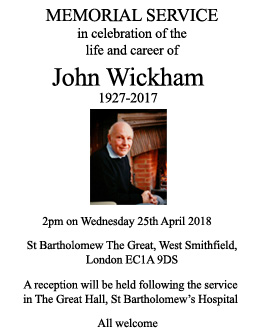
The news of the passing of the legendary John Wickham on 26 Oct 2017 will sadden many. Here is a celebration of the life of a visionary thinker, innovator and pioneering surgeon.
Born in Chichester, John moved with his mother to Littlehampton and spent many happy years in rural Sussex. This year he published his book “An Open and Shut case – The story of Keyhole or Minimally Invasive Surgery” which describes his unique journey through life and his passion for reducing the trauma of surgery for the benefit of his patients. A couple of years before this, he sent me the “raw” version to read and comment on. This will forever remain a treasured possession along with a first signed copy of the final version which arrived on my desk in May 2017. A brilliant exercise in honest writing combined with his wry humour.
There were a number of exciting events in his childhood. He describes “epilation radiotherapy” to his scalp to eradicate ringworm which he provides as the explanation for the lack of hair in later life. Such personal touches keep the reader engaged as do his daily travels from Littlehampton to Bart’s (St. Bartholomew’s Hospital), costing £16 per quarter. He was interviewed by Sir William Girling-Ball for his entry into medical school and subsequently worked for Sir Ronald Bodley-Scott, physician to HM the Queen. Time spent in the Royal Air Force (RAF) toughened him up for the complexities of life as a surgeon.
He was trained in urology by Mr A W Badenoch, another legend in his own right. John describes his first inguinal hernia repair, during which his chief had to leave to take a phone call and he was saved by guidance from the anaesthetist. In his days the pass rate for the FRCS was around 10% and he was one of the lucky ones! He subsequently worked with Prof. Ian Aird of the textbook fame. He met his wife Ann, during a below knee amputation from behind a surgical mask. He was awarded a Fullbright scholarship to Lexington, USA which he thoroughly enjoyed. Despite the offer of a job to stay back, the family decided to return to the UK, where he became a Bart’s man, going on to lead the Department of Urology as its head with Bill Hendry as his colleague.
He was also the Director of the Academic Unit at the Institute of Urology at the then 3Ps (Peter, Paul and Phillips) Hospitals and after the move of St. Peter’s to the Middlesex Hospital. He was also Consultant Urological Surgeon to the King Edward VII Hospital and The London Clinic.
He is credited with a number of pioneering achievements. His device for renal cooling with coils was published in the BJU in 1967. He worked with the famous Sir David Innes Williams and was awarded the Hunterian Professorship. He also published a seminal paper on urethral pressure profile.
Very few will know that he was sidelined with an attack of acute pancreatitis and needed a cholecystectomy for gall stones.
He developed PCNL with Mike Kellett and then the Society and Journal for Minimally Invasive Therapy (SMIT) as well as the Intrarenal Society. He inspired the future generation of great innovators like Graham Watson, Ron Miller and Malcolm Coptcoat, to name a few. With the help of the Kuwait Health Office he managed to instal a Dornier lithotripter in Welbeck street which was revolutionary in those days.
John developed the PROBOT, the first autonomous surgical robot with Prof. Brian Davies at Imperial College. Initially tested in potatoes, it was then refined with the addition of a mapping ultrasound and a vaportome, leading to a world first clinical trial at Guy’s, where he had moved to with the support of Lord Ian McColl. In this project, he was ably helped by Malcolm Coptcoat, Anthony Timoney, Senthil Nathan and Bibhas Kundu. Many years later this device was displayed at a public exhibition at the Royal College of Surgeons of England. It is curious how autonomy is again being discussed amongst roboticists after some 30 years.
Following retirement from the NHS he continued to innovate by establishing a company called Syclix which allowed him to design laparoscopic instruments with pen like grips rather than the traditional handles. He arrived at Guy’s one summers morning to show me these instruments to try on one of my laparoscopic nephrectomy patients. At my request, he examined Ben Challacombe’s thesis on the first ever randomised trial of telerobotics and was then guest of honour at our first robotics symposium in 2004 and the inauguration of the King’s-Vattikuti Institute of Robotic Surgery in 2014.
While clinically active he did his best to spread his philosophy about Minimally Invasive Surgery throughout the world by lecturing and publishing articles in the BMJ, amongst other journals. Many did not believe in him, but he was clearly light years ahead of his time. He received numerous honours, which included the Cheselden Medal and the Galen Medal of the Society of Apothecaries.
It was a privilege to know him and he will remain a lasting inspiration to many.
Prokar Dasgupta
Editor in Chief, BJUI
BJUI has published a special Virtual Issue celebrating the legacy and work of John Wickham

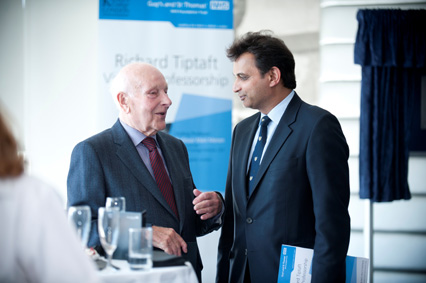
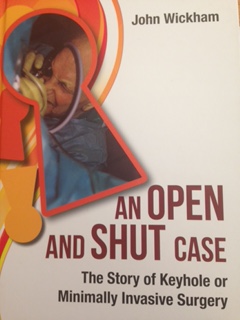

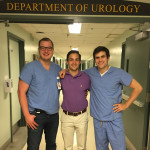
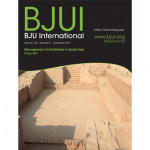
My late husband, Malcolm Coptcoat, considered John as his mentor, friend and inspiration for his pioneering work in laparoscopic surgery, and he admired John greatly.
That is a wonderful tribute Prokar and a touching celebration of a legend in urology.
Vale John Wickham
John Wickham was a true visionary and really defined minimally invasive surgery in Urology. I was privileged to have known him and been examined by him. Some members of our theatre team still remember the Probot trials. He was so excited to learn about modern robotic surgery and I photographed him trying the da Vinci Xi system when he came to Guys in 2014.
A man who deserved more recognition than he received.
JEAW as he was popularly called, was a living legend in his times. His thought processes were truely light years ahead!
In the wee hours of the morning, be it the foggy winter or the bright summer, he would report in his Devonshire office, driving some 30 miles from Dorking in his Merc SL 500. His love for automobiles almost equalled his zeal as a Urologist. His fleet of vintage cars were a treat for visitors. He could assemble and perfect a car from a near write off situation.
He never lost his cool and never raised his voice to be heard beyond a mumble- every word was valuable!
Some of his works in open Urology like radial nephrotomy for multiple calyceal stones
(pre PCNL era) Partial Nephrectomy with kidney cooling, are archived in the Institute of Urology.
I first met John in 1989, when the Society of Minimally Invasive Therapy was founded. This organisation, which he conceived and led, reflected his open mindedness and his willingness to consider new ideas. He recognised immediately that interventional radiology was inherently minimally invasive, and agreed to change the initially suggested name from ‘the society of minimally invasive surgery to ‘the society of minimally invasive therapy’, to include all disciplines that provided the least traumatic treatment that achieved the desired outcome.
John was extremely kind, thoughtful, hugely intelligent and immensely wise. But he also managed to maintain the enthusiasm of youth into his old age, and took delight in all new things that gave him pleasure – from surgical robots to antique racing cars.
The image I have of him is one I have seen hundreds of times in all the years I have known him – a kind face, with bright eyes and a wonderful smile, as he described excitedly a brilliant new idea that would improve the treatment of patients.
To Sir with Love – The last of the Mohicans
A great soul has passed away and many will remember his pioneering works, innovations and ideas.
Behind this was a calm, assured intellect who frequently thought the present norms in surgery were outdated. Working as his fellow, registrar and lecturer for three years I was pitted constantly against his brainstorming interludes. His routine day was 14 hours long with ward rounds promptly at 6 am. In theatre he was Captain Cool and never lost his temper but calmly reminded the team to get on with it. His patients loved him and many still enquire fondly about him remaining grateful.
He firmly believed the less trauma to patients during surgery the better their recovery. Towards this he constantly strived to make the incisions smaller and said ‘ Don’t extend your incision to the area of interest but move your incision to it.’ Having mastered percutaneous and laparoscopic surgery he cried the present instruments were not ergonomic. He worked closely with industry and his experience at Royal Air Force allowed him to constantly design and engineer new instruments. It was an honour and pleasure to help him with the developments of Transurethral vaporisation of the prostate; Transrectal and transurethral ultrasound scan of the prostate, Robotic TURP; Robotic percutaneous nephrostomy; tissue morcellator; hyperthermia and thermotherapy. At the end of it all he announced ‘What we do now is archaic and the future will be image guided energy treatments, then we can call ourselves a civilised race.’
Ann and he were a wonderful couple and with his three daughters a great family. The doors of their lovely home was always welcoming and you frequently found the boss in mechanic overalls. Even here he quipped ‘Surgery is like repairing a motor, take it down slowly and put it back carefully if you want the motor to run.’ Probably the reason why he reconstructed every tissue he cut.
It is over twenty years and as he retired from clinical practice he continued to research into modelling instruments, examining and lecturing. An era has passed and many around the world will agree he has been and will be missed. I hope one day we achieve your aspiration of the patient driving into the hospital for his surgery and driving out the same day.
To my teacher, mentor and god father. As you always fondly called me: Your Last Mohican
John Wickham‘s quiet and reflective manner meant that he and his achievements tended to fly below the radar. He had the intellect, drive and courage to challenge what was conventional urological practice. His ground-breaking research in renal preservation and endoscopic upper tract surgery, in particular stone surgery, has resulted in the high level of refinement of contemporary management. However, among his many notable original achievements, his prophetic role in the development of minimally invasive surgery stands out and, in my opinion, warrants John being regarded as the father of this form of urology and surgery.
I count myself greatly privileged to have been able to work with John and to have been exposed to his intellect, benefitted from his mentoring and to have enjoyed his and Ann’s friendship. As a role model, John stimulated me to pursue a career in academic urology. I owe him an immeasurable debt.
Thank you Prokar for placing the life and achievements of “a urologist of our time “ in historical and innovative perspective. We can all truly say we new this great mind at “the turn of the century” having commanded an inspiring position through half the last century!
Fond memories of chatting to him at Annie and David Rickards home last year at their summer fest!
We will miss you John!
Huge loss to Surgery and Urology in particular. A true pioneer and innovator!
Thank you Prokar for the kind words and the nice piece to introduce John Wickham to this generation of urologists that haven’t known the legend!
A good tribute to a great man.
His book is a timely epitaph to an extraordinary visionary, who genuinely pioneered the transformation of Urology from an open to an endoscopic speciality. We are the legacy of his work, and our patients the beneficiaries of his campaign for minimally invasive surgery (as opposed to being merely “minimal access”.
A Urological Legend; may he rest in peace.
So very sad that John passed away just before his 90th birthday, as Mike Kellett had some celebrations planned to honour the great man. John taught me at St Paul’s Hospital in Covent Garden where I was seconded from the Middlesex in 1984. He and Mike Kellett were pioneering percutaneous stone surgery at that time and they were inspirational teachers and practitioners. Do read John’s obituary in The Times: https://www.thetimes.co.uk/article/john-wickham-obituary-ntxgj5t96. A memorial service is being planned for the end of April at Bart’s Hospital.
That’s a well written and personal piece Prokar. Thank you for bringing my attention to his book, which slipped under my history radar, I will be getting that and look forward to reading more about a man I wished I had met.
I was very sorry to hear of John Wickham’s recent death. He will be remembered as one of the giants of urology. Innovative and visionary he pioneered the changes we now take for granted.
Famously he assisted the late Malcolm Coptcoat in kings to perform the first laparoscopic nephrectomy in Europe.
He had given an interview to the living witness programme which can be heard on the BAUS website.
John was friendly and approachable and a great example.
He will be very much missed by us all.
My condolences to his family
Peter Thompson
Such sad news! John was truly “a legend” and an extraordinary innovator who deserves a place in the pantheon of urological heroes! Read his obituary in The Times: https://www.thetimes.co.uk/article/john-wickham-obituary-ntxgj5t96
We are working on one for the Telegraph bas I write.
A memorial service to commemorate the life of John E.A.Wickham will be held
In the Priory Church of St Bartholomew the Great on Wednesday 25th April
2018 at 2.0 pm, to be followed by a reception in the Great Hall of
St Bartholomew’s Hospital Smithfield London.
John’s obituary from the Daily Telegraph: John Wickham, who has died aged 89, was a urologist who pioneered keyhole surgery in Britain, using small incisions and specialised instruments to reduce scarring and aid patients’ recovery.
Appointed as a consultant urological surgeon at St Bartholomew’s Hospital in London in 1966, Wickham soon set about tackling what he saw as a gung-ho attitude among certain staff. At that time many surgeons prided themselves on being able to perform a wide range of procedures, and patients often needed several weeks to recover from their ministrations. To Wickham, who had initially considered a career in neurosurgery and had witnessed the extraordinary delicacy of operations on the brain, the scars left by more general surgeries seemed brutal and unnecessary. “I was fed up taking out tiny little [kidney] stones and going to the patient the following day and saying ‘look, we got your stone out!’, with a socking great gash,” he recalled.
Searching for an easier way to rid the body of kidney stones, Wickham and his colleague Michael Kellett embraced a new technique called percutaneous nephrolithotomy. This involved making a tiny incision in a patient’s back and threading in a tube through which the stone could then be removed.
Wickham coined the term “minimally invasive therapy” to describe this approach. In 1992 he and another colleague, Malcolm Coptcoat, managed to remove an entire kidney through an incision less than half an inch across, in the first procedure of its kind in Britain. They detached the kidney from the surrounding tissue and sealed it – still inside the body – in a watertight bag. The kidney was then minced up using an instrument called a morcellator and sucked out through the incision. Patients undergoing this procedure could expect to be out of hospital in a few days, and well on the road to recovery within a fortnight.
John Ewart Alfred Wickham was born in Chichester, West Sussex, on December 10 1927. His father Alfred worked in event management until his sudden death in 1931. John then moved with his mother Hilda to a flat at Littlehampton. At Chichester High School for Boys he studied botany, physics and chemistry and spent his free time collecting scrap metal from downed aircraft. In 1942 he joined the school’s Air Training Corps and learnt how to dismantle and repair aircraft engines – an experience that would inform a later passion for restoring vintage sports cars.
After the war Wickham did National Service with the RAF before completing his clinical studies at Barts. For his final exam he was asked to look at a patient with a cardiac complaint, and was mortified to report that he could find no sign of any abnormality. “That’s all right,” the examiner replied: “neither did we.” He became a fellow of the Royal College of Surgeons in 1959, and was awarded his Master’s degree in 1966.
Throughout his career Wickham strove to improve upon the equipment available to him in theatre. He set up his own clinic in Welbeck Street and began treating patients with a machine that disintegrated kidney stones using high-energy shock waves. In 1992 he moved to Guy’s Hospital and teamed up with a robotics specialist, Professor Brian Davies, to build the world’s first special-purpose surgical robot. The “Probot” was successfully tested on around 30 patients requiring surgery on the prostate gland.
Wickham met his future wife, Ann Loney, in the operating theatre while he was performing a below-the-knee amputation. Struck by the “beautiful blue eyes” visible over the top of her surgical mask, he invited her out on a pub crawl. They were married in 1961, just 18 months after that first encounter. She survives him, along with their three daughters.
The BJUI has just published an issue of John Wickham’s best papers with a nice cover.
Please do circulate widely amongst his many friends.
https://www.bjuinternational.com/bjui-blog/cover-celebrating-legacy-john-wickham/
Thanks to Declan Murphy, I was able to give this tribute at the USANZ meeting
Claude Abbou receives the first Wickham Medal at ERUS2018